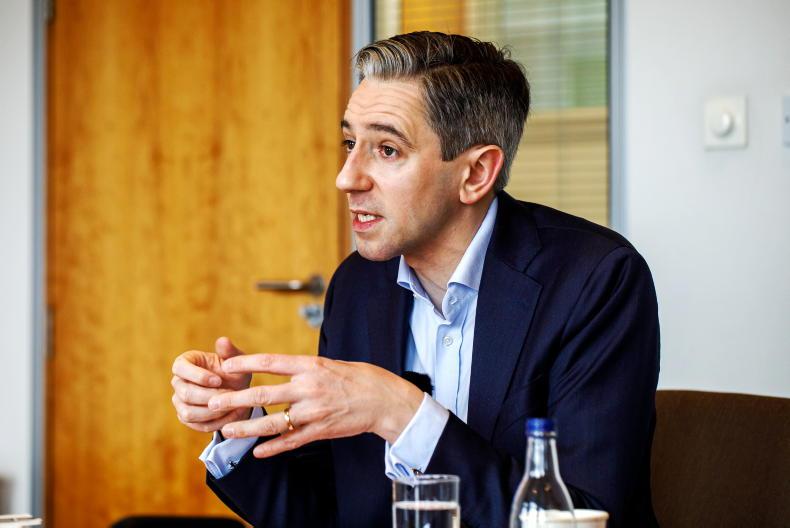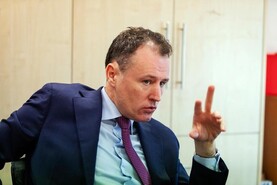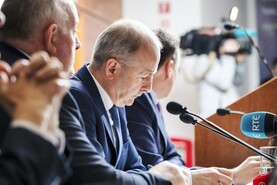“Fine Gael have got your back, we will not let you down. Should I be fortunate enough to lead the Government, everything we do will be about protecting the family farm. I want farmers to be farming, not filling out forms.”
That is Taoiseach Simon Harris’s pitch to farmers with a week to go in the general election campaign.
“Since I’ve become party leader, I hope farmers have seen a real effort to humbly reconnect”, he says.
On farm succession he said that his party is “absolutely” going to deliver a farm retirement scheme.
“But we’re not going to deliver one that is as rigid as the past. Some of the retirement schemes of the past required a farmer to immediately cease all agricultural activity.
“That doesn’t really understand how the family farm works.
“So what we’re going to propose is a farm retirement scheme that really involves a level of farm mentorship that allows you to take a step back, but also allows you to keep in, in a way that works for you.”
When asked about discouraging land purchases for the purpose of wealth transfer, he said: “I’d like to do this, but I also want to be honest with farmers, property rights are very strong in our constitution.
“We even saw in the recent budget where we tried to take measures to make sure that relief is only applied to active family farms.
“And we saw the unintended consequences, and needed to pause that.
“You’re not as limited in terms of how you use the tax code to help incentivise the transfer of land.
“We’ve been very clear that the reliefs and supports that are in place to help that transfer from one generation to the next are maintained.
“We’re trying to tighten it up so that people can’t take advantage of that.”
The CAP budget has to be bigger, Harris says.
“There’s inflation, so if you don’t make it bigger, the real term value of CAP will be reduced, and that would be a cut to farmers incomes,” he told the Irish Farmers Journal.
“But it also has to be reformed. So many farmers in Ireland are now opting out of schemes due to the rigidity applied.
“I’m a little bit disappointed in this election that there’s lots of parties just talking about an extra few bob for this, or an extra few bob for that.

Taoiseach Simon Harris in interview with political correspondent Pat O'Toole. \ Philip Doyle
“They’re entirely missing the point.
“If we don’t simplify the schemes, if we don’t move beyond the cost incurred, income foregone model, you’re going to see farmers continue to opt out of schemes.
“So you can set the level of payment at whatever you want.”
The outgoing Taoiseach said that Ireland has to make sure that defence and security spending or climate spending must not come at the expense of farming at European level.
“We’re finally winning the argument that when we talk about security, food security is a part of that, because we saw how exposed the European Union was in terms of food security when Russia brutally invaded Ukraine.
“We will fight that fight, and I believe we’ll win that fight, at a European level.
“My party Fine Gael is well placed to do so, because we’re in the European People’s Party (EPP), which is the biggest party in the parliament.
“The Agriculture Commissioner and the President of the Commission are EPP.
“When I go to the European Council, the largest number of prime ministers and presidents around the table are from the EPP, we have that really big coalition.”
The nitrates derogation issue involves two things, science and politics, Harris says.
“The science is real, water quality is a real problem in Ireland.
“The big problem is not farmers, by the way, let’s be honest, the big problem is often public bodies.
“But water quality is a real issue, and we have to be able to credibly show scientifically how we’re going to improve it.
“But alongside science is politics.
“We have to win the argument at a European political level that this is crucial for Irish agriculture, which is the backbone of our economy.
“At a time when we’re likely to see transatlantic trade shocks and the likes, it is more important than ever that we back indigenous industry, and there no more indigenous industry than farming.
“We need to be able to show Europe that there is a pathway.
“We’re not where we
need to be yet, but we have the plan to get there, and we now have the money to fund that plan.”
“Fine Gael have got your back, we will not let you down. Should I be fortunate enough to lead the Government, everything we do will be about protecting the family farm. I want farmers to be farming, not filling out forms.”
That is Taoiseach Simon Harris’s pitch to farmers with a week to go in the general election campaign.
“Since I’ve become party leader, I hope farmers have seen a real effort to humbly reconnect”, he says.
On farm succession he said that his party is “absolutely” going to deliver a farm retirement scheme.
“But we’re not going to deliver one that is as rigid as the past. Some of the retirement schemes of the past required a farmer to immediately cease all agricultural activity.
“That doesn’t really understand how the family farm works.
“So what we’re going to propose is a farm retirement scheme that really involves a level of farm mentorship that allows you to take a step back, but also allows you to keep in, in a way that works for you.”
When asked about discouraging land purchases for the purpose of wealth transfer, he said: “I’d like to do this, but I also want to be honest with farmers, property rights are very strong in our constitution.
“We even saw in the recent budget where we tried to take measures to make sure that relief is only applied to active family farms.
“And we saw the unintended consequences, and needed to pause that.
“You’re not as limited in terms of how you use the tax code to help incentivise the transfer of land.
“We’ve been very clear that the reliefs and supports that are in place to help that transfer from one generation to the next are maintained.
“We’re trying to tighten it up so that people can’t take advantage of that.”
The CAP budget has to be bigger, Harris says.
“There’s inflation, so if you don’t make it bigger, the real term value of CAP will be reduced, and that would be a cut to farmers incomes,” he told the Irish Farmers Journal.
“But it also has to be reformed. So many farmers in Ireland are now opting out of schemes due to the rigidity applied.
“I’m a little bit disappointed in this election that there’s lots of parties just talking about an extra few bob for this, or an extra few bob for that.

Taoiseach Simon Harris in interview with political correspondent Pat O'Toole. \ Philip Doyle
“They’re entirely missing the point.
“If we don’t simplify the schemes, if we don’t move beyond the cost incurred, income foregone model, you’re going to see farmers continue to opt out of schemes.
“So you can set the level of payment at whatever you want.”
The outgoing Taoiseach said that Ireland has to make sure that defence and security spending or climate spending must not come at the expense of farming at European level.
“We’re finally winning the argument that when we talk about security, food security is a part of that, because we saw how exposed the European Union was in terms of food security when Russia brutally invaded Ukraine.
“We will fight that fight, and I believe we’ll win that fight, at a European level.
“My party Fine Gael is well placed to do so, because we’re in the European People’s Party (EPP), which is the biggest party in the parliament.
“The Agriculture Commissioner and the President of the Commission are EPP.
“When I go to the European Council, the largest number of prime ministers and presidents around the table are from the EPP, we have that really big coalition.”
The nitrates derogation issue involves two things, science and politics, Harris says.
“The science is real, water quality is a real problem in Ireland.
“The big problem is not farmers, by the way, let’s be honest, the big problem is often public bodies.
“But water quality is a real issue, and we have to be able to credibly show scientifically how we’re going to improve it.
“But alongside science is politics.
“We have to win the argument at a European political level that this is crucial for Irish agriculture, which is the backbone of our economy.
“At a time when we’re likely to see transatlantic trade shocks and the likes, it is more important than ever that we back indigenous industry, and there no more indigenous industry than farming.
“We need to be able to show Europe that there is a pathway.
“We’re not where we
need to be yet, but we have the plan to get there, and we now have the money to fund that plan.”







 This is a subscriber-only article
This is a subscriber-only article










SHARING OPTIONS: